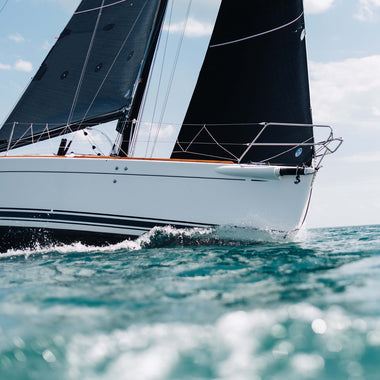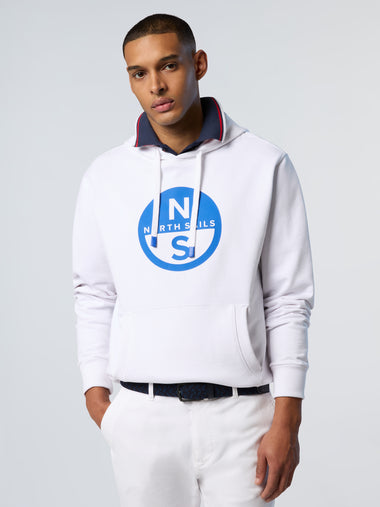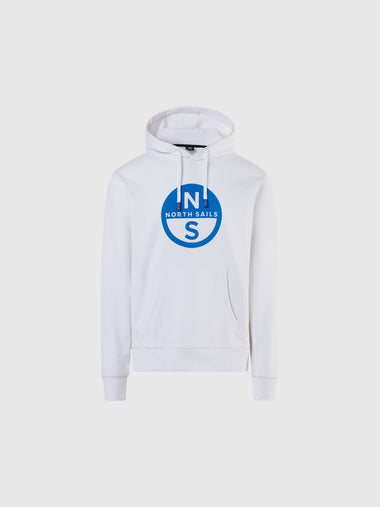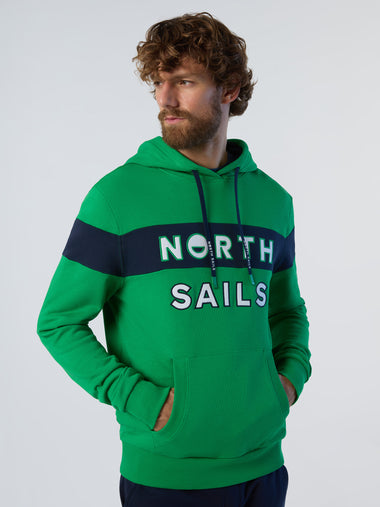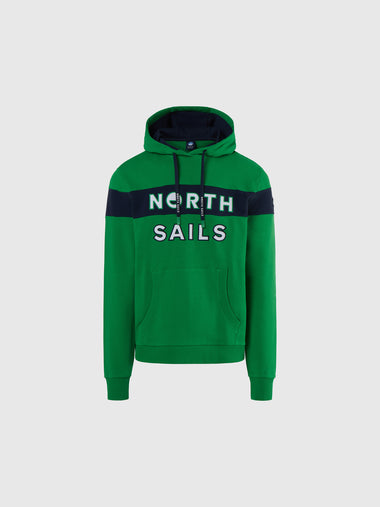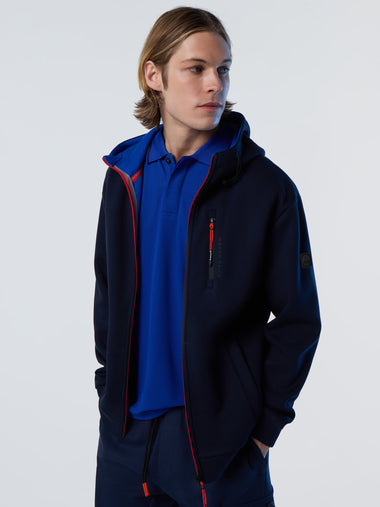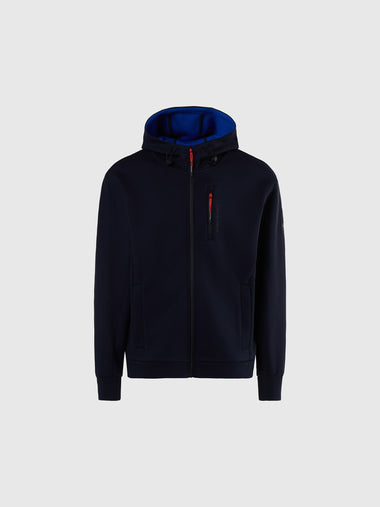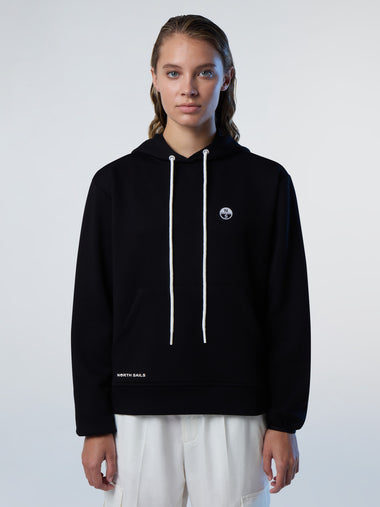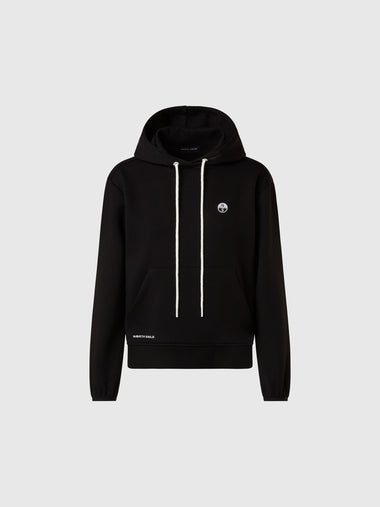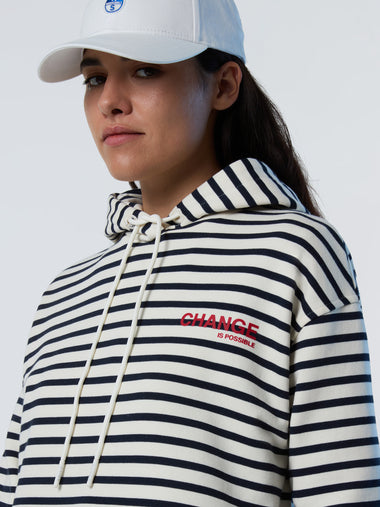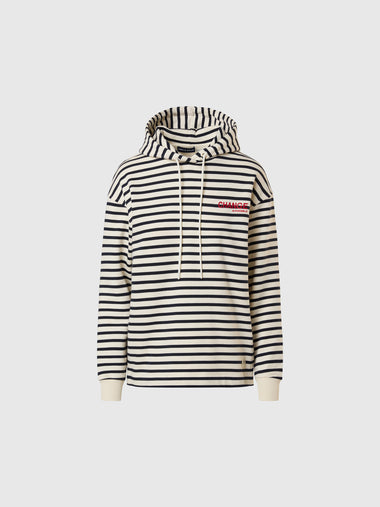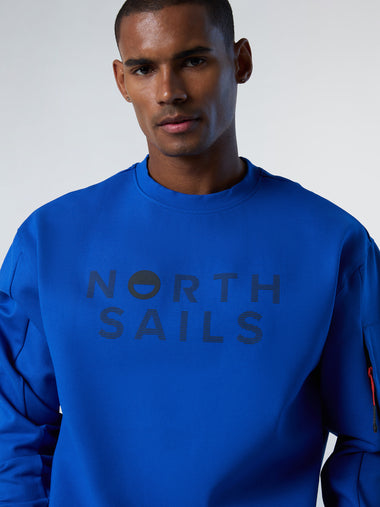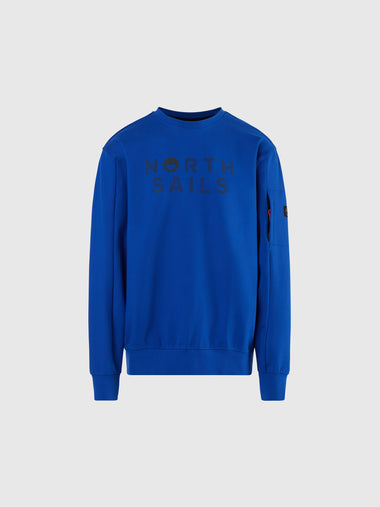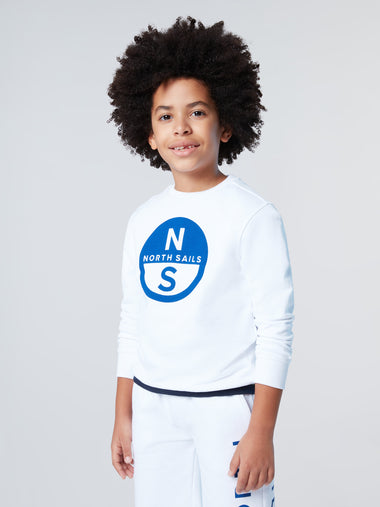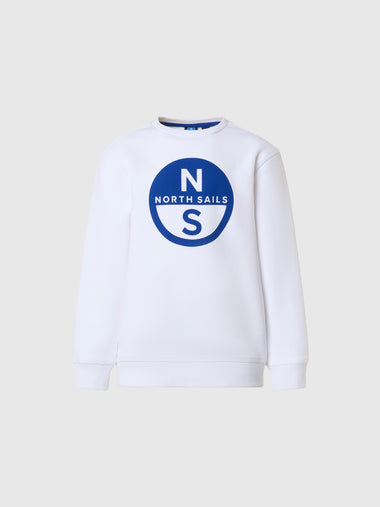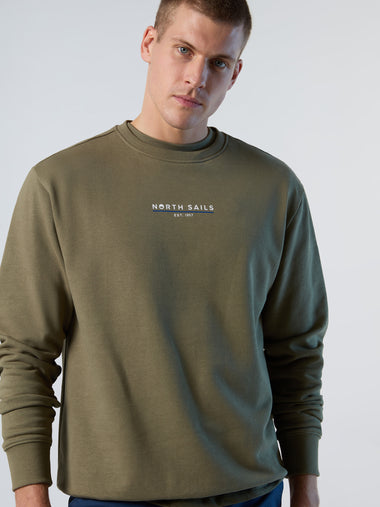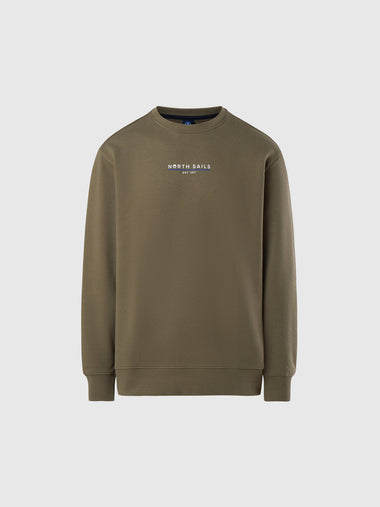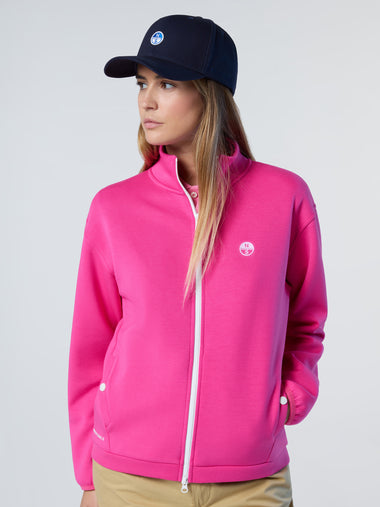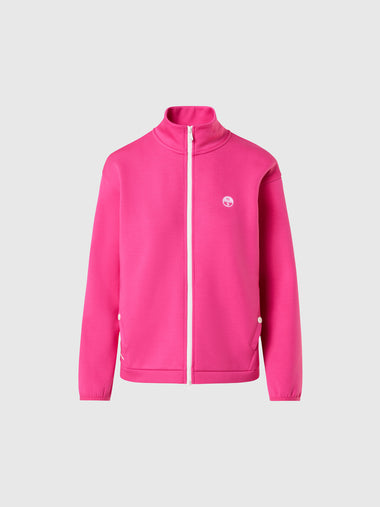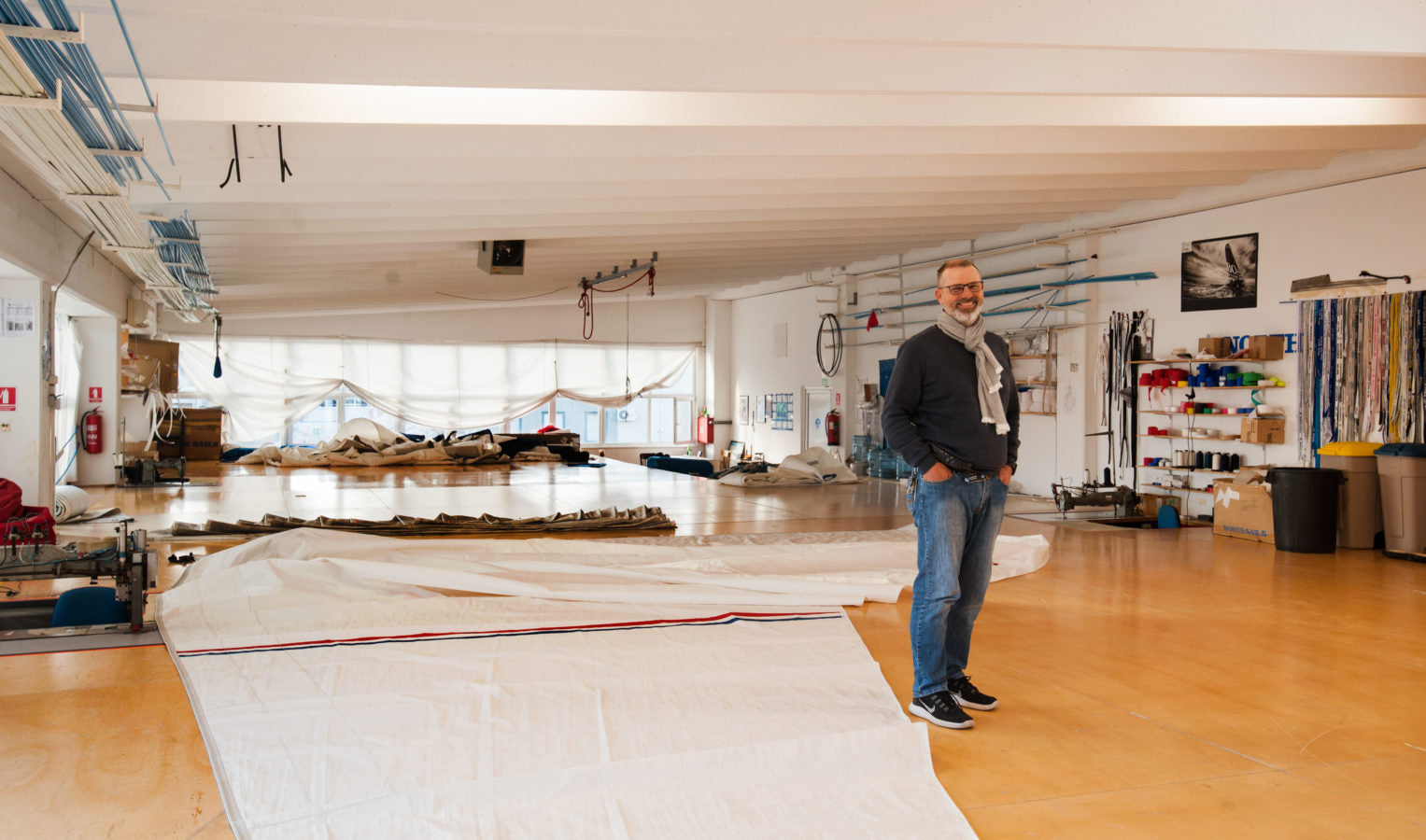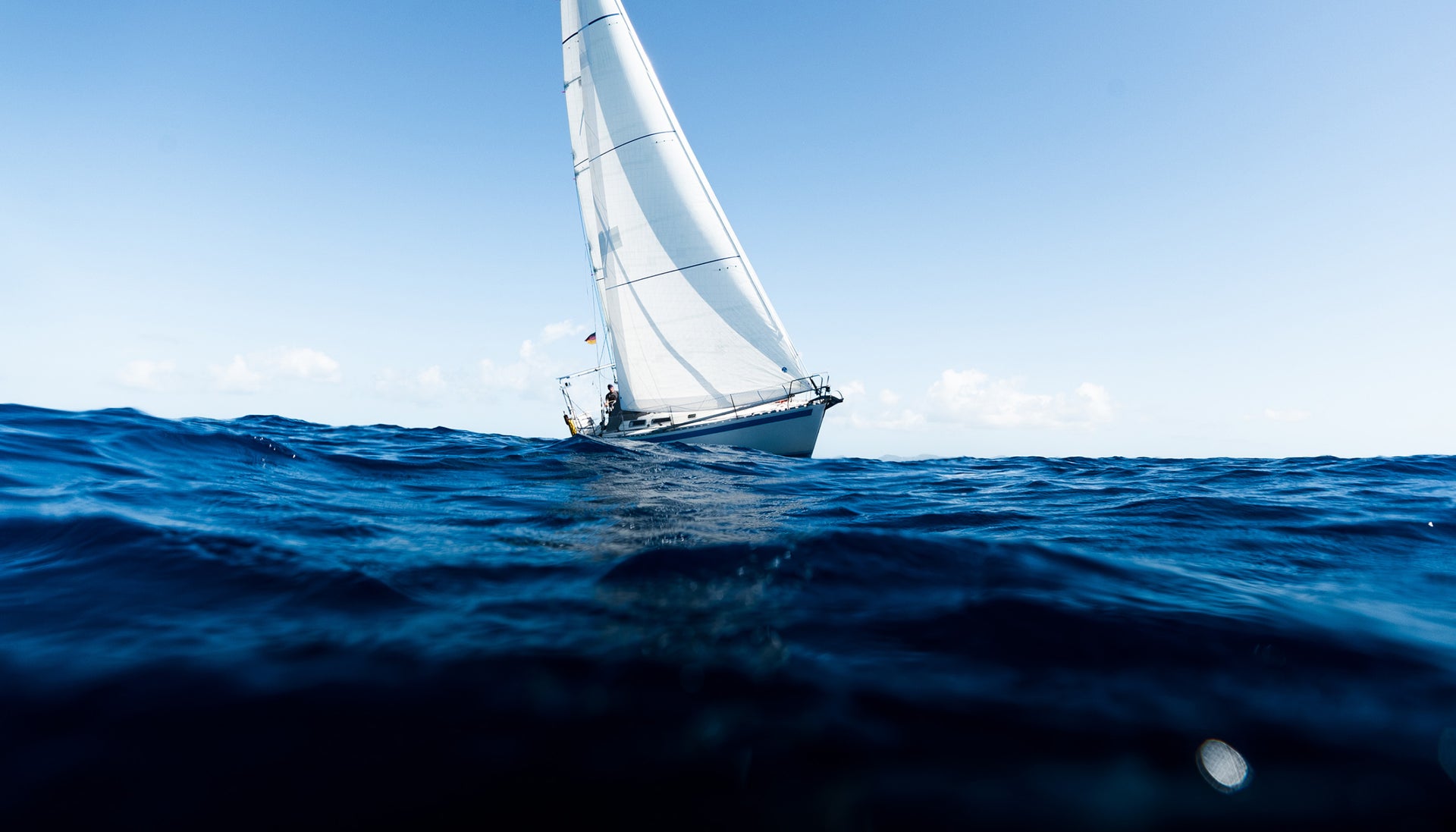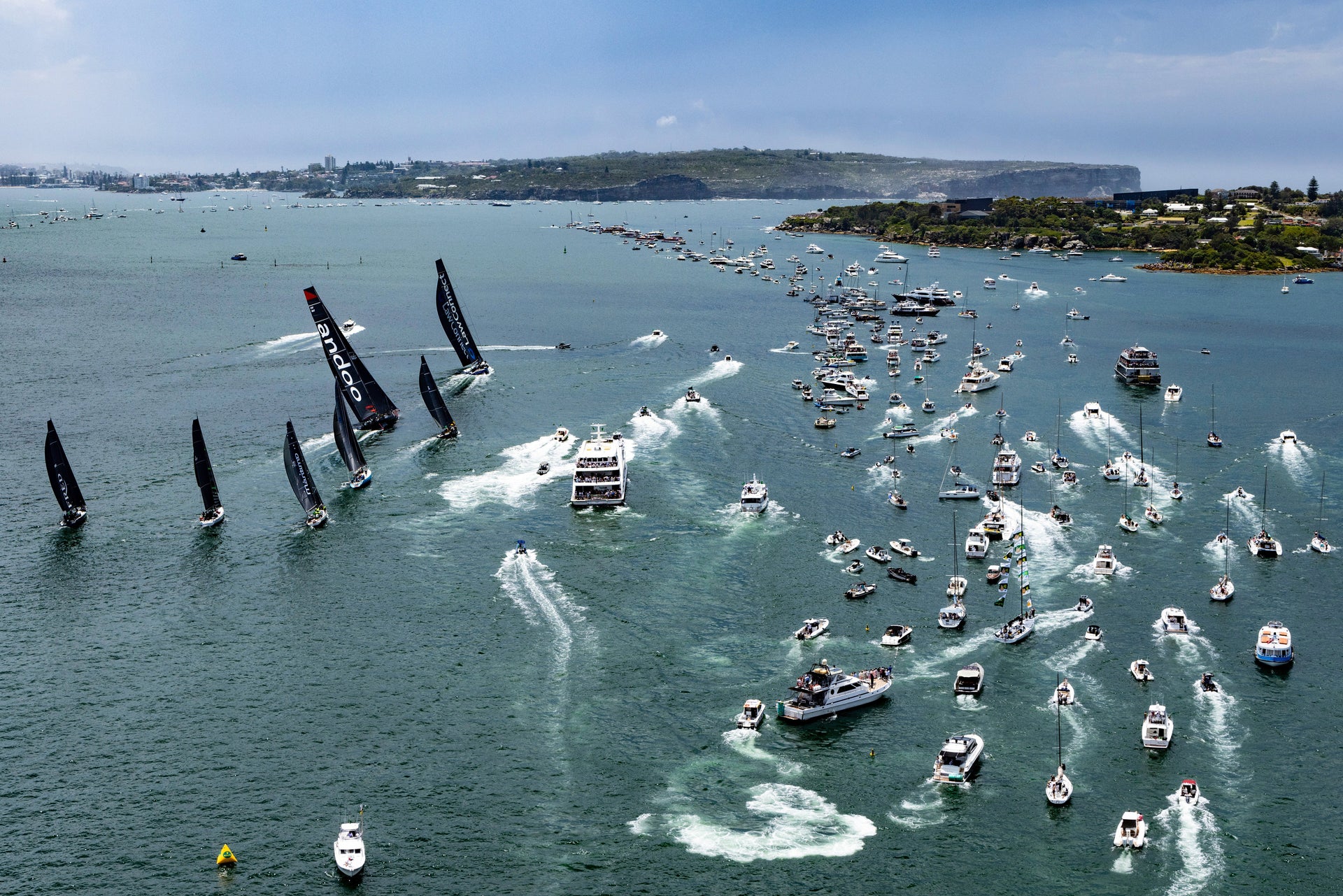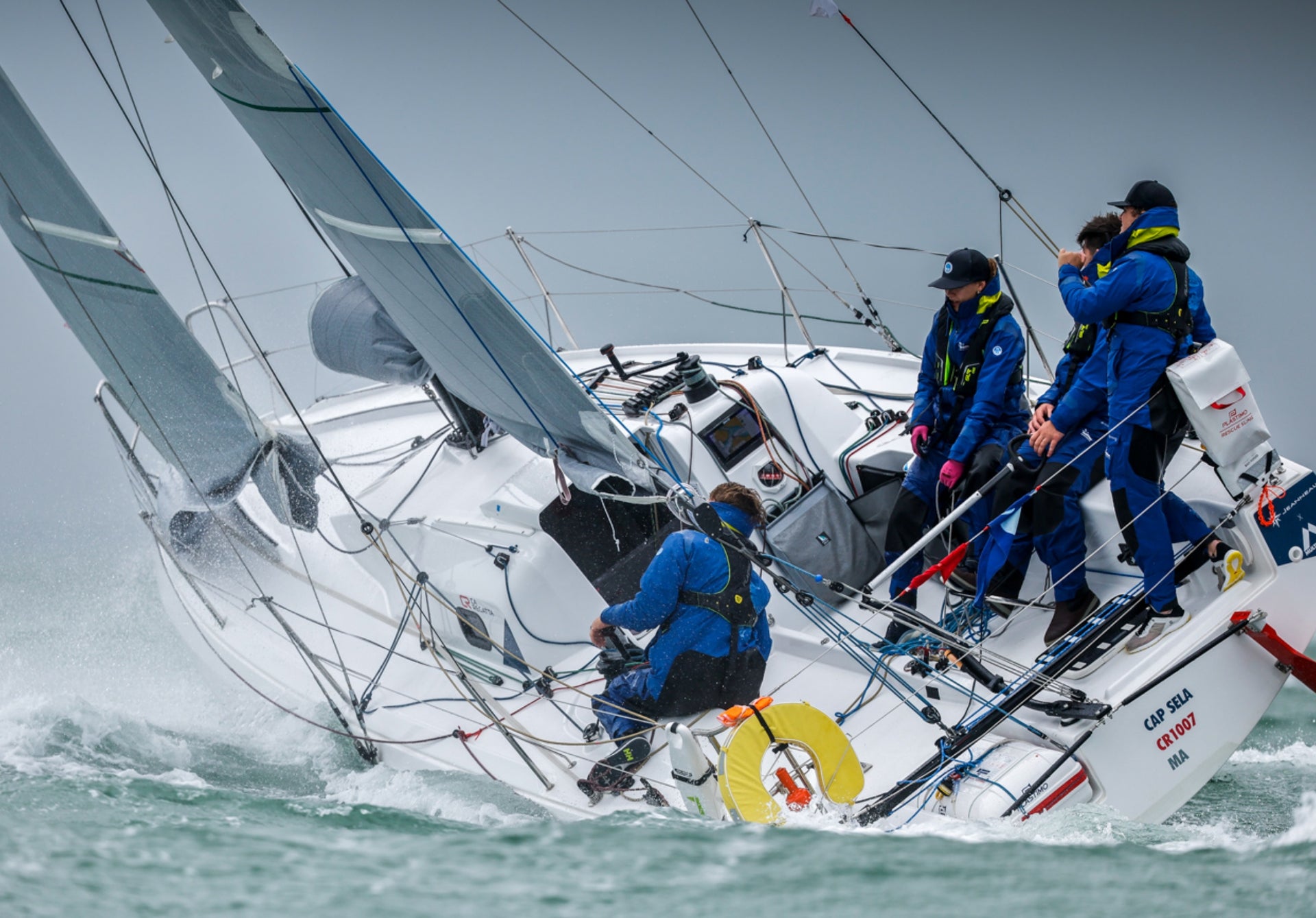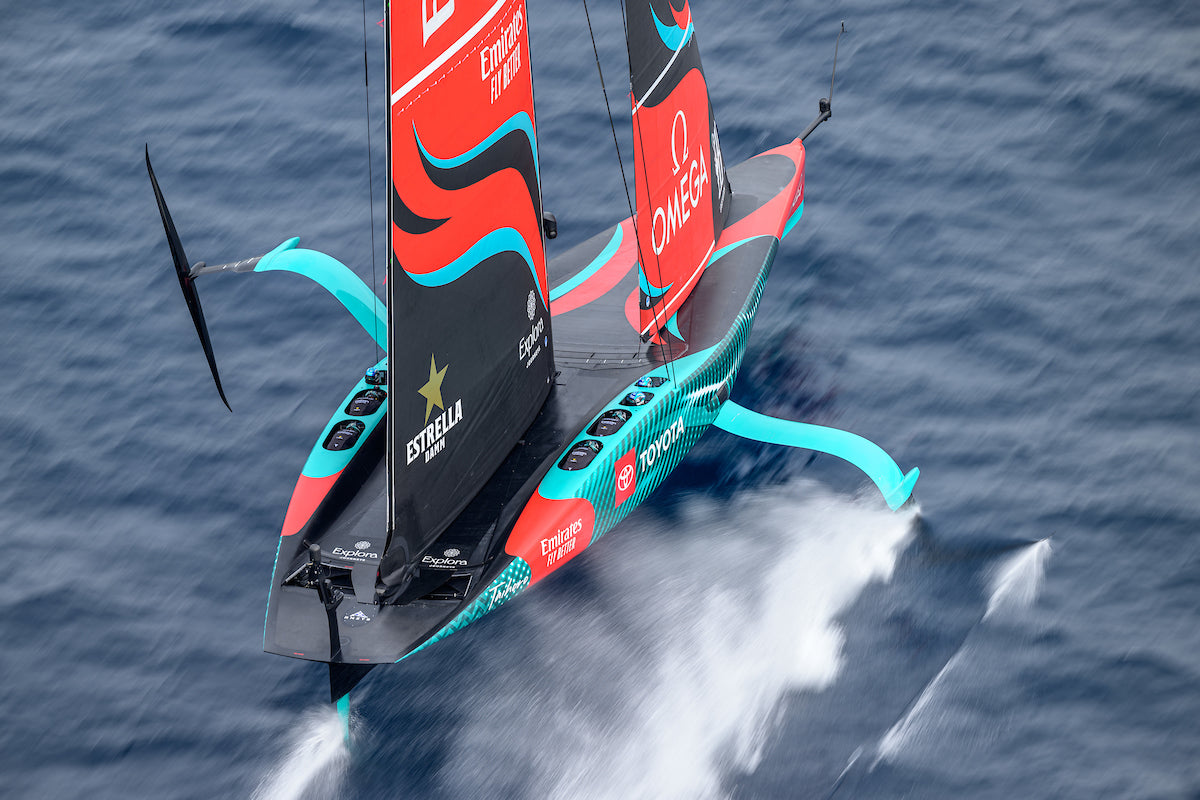CARRYING ON A FAMILY SAILING TRADITION
Stjepan And Marko Marinovic Facilitate Regional Sales And Service In Croatia

With the ORC Worlds coming to Croatia this month, we take a look at North Sails Team who founded and have grown the business there for the past 15 years. Stjepan and Marko Marinovic grew up sailing with their family on a variety of boats. Decades later, they’re still working together;
the two founded North Sails in Croatia in 2004.
Stjepan is five years older, which is why there are no stories about the two of them getting into trouble together. “There was too big a difference in the years,” Marko explains, adding that Stjepan was a good brother. “I was the bad brother,” he admits—perhaps joking, or perhaps not.
“Coming from an island as a family,” Stjepan says, “there is a strong maritime tradition in both shipping and sailing.” Their father was a black sheep, “because he first ran a motorship, then a sailboat.” The kids learned to sail on an eight meter wooden cruiser; Stjepan also raced Optimists, while Marko competed in the Laser.
“The natural thing was for me and my brother to go to the nautical academy,” Stjepan continues. After graduation from the University of Split, he went to sea as a master mariner and began to live a double life. “I had my quite serious professional life; all rules have to be obeyed, supervising the loading of ocean-going ships. In the summer, I was completely crazy! Cruising and racing around the Adriatic, in all kinds of funny boats.” First it was a half tonner, then an IMS 35, and then the craziest boat of all; a 40 footer built to sail on Lake Garda, which “against all advice,” they sailed in the open waters of the Adriatic for several years.
When their father refused to finance any more sail purchases, the brothers began working for North Sails Cape Town on commission. “We started selling sails to other people,” Stjepan says. “When we got enough credit, we purchased a sail for our boat. So that is the reason we started working with North.” Ten years later, he continues, “we were doing so well that North Sails Italy started complaining that we should work with them.”
The timing was right for Stjepan to retire from his “serious professional life” and move ashore, so in 2003 he talked Marko—who had just earned his own maritime transport engineering degree from the University of Split—into opening a sail loft instead of going to sea. “We made a joint company between North Sails Italy and me and Marko,” Stjepan explains. Sixteen years later, the pair oversees two lofts, in
Dugopolje and
Sukošan, and twelve employees.

Marko likes working with North Sails. After taking several years off from racing, he’s recently started competing again in the Snipe and the Star. He also sails with clients, which he thinks is good for everyone. “It's very useful to be inside the company,” he says. “You get really good information and very quick. Nothing more do you need, if you're a sailor.”
Even in the early days, their company never produced any sails; they’ve always specialized in selling and after sales. According to Stjepan, their loft was one of the first in the world to do so. “We are only sellers, like a car dealer,” he explains. There’s enough volume to justify that along the Adriatic coastline, an area renowned for its excellent cruising and racing.
“It is quite rocky, with a lot of islands,” Stjepan continues. “Maybe 1,000? And we have six months of nice weather with very predictable thermals. There’s a huge amount of boats sailing around, and I would say 50% are used in charter. The nautical industry is quite strong in Croatia, and we know all the local guys. But most of our clients are people coming from abroad who have no idea what I'm doing. Maybe now they'll understand that I'm not just another charter skipper!”
Stjepan also races classic yachts. In 2016 he was part of the winning crew on Mariette for the Superyacht Cup in Palma, and he helped Kelpie of Falmouth win the classics cruiser class at Les Voiles de St Tropez.
Both brothers agree that 3Di changed their business—and Stjepan admits he wasn’t certain about it at first. “I delivered my first 3Di Sails to a guy on a Beneteau 40.7 for the ORC World Championship in Italy in 2013,” he says. “It was supposed to be light thermals, but we had thunderstorms. Upwind for thirty-six hours, in 45 knots…”
Two days later, they headed out for another race; there had been no time to inspect the mainsail. Stjepan compares hoisting it to “opening a box of chocolates; I didn’t know if I’d be hoisting garbage. Instead it’s looking like new! That was a huge relief.”
“I’m a really big fan of 3Di,” Stjepan continues. “The good thing is that it’s really fast, long-time fast.”
Marko agrees. “The technology with 3Di is an advantage, so it's easy to convince racing clients to purchase 3Di sails. We have a very easy job to please our clients, which I think is most important.”
"I’m a really big fan of 3Di," Stjepan continues. "The good thing is that it’s really fast, long-time fast.” Marko agrees, "The technology with 3Di is an advantage."
Business-wise, Stjepan admits there is a downside to 3Di. “People are not buying sails so often. From 2006 to 2013, I sold four or five mainsails to this one guy. Since 2013, the boat is still having the same main.” But there is much less fuss, he adds, so “people are really happy. It's a good product, a really good product.”

Both brothers have families of their own, and Marko enjoys winter skiing in the Dolomites with his wife and daughter. In summer, the trio takes a two week cruise onboard a half tonner that used to belong to his father. “He sold it, I buy it back sixteen years later, and I make modifications with the fridge and this kind of stuff. You have much more possibilities to enjoy the Adriatic with a small boat.” When Marko has more time, he’d like to race this boat again.
Stjepan has a son and daughter and no ambitions in any other sport besides sailing. “The pastime in my home town is drinking coffee,” he explains, with that dry humor that makes it hard to know if he’s serious or not. “So when I'm not sailing or messing around with boats, I go and have a quiet coffee seaside.” Asked if it was very competitive, he explains the local approach; “You should drink your coffee for as long as possible. It's called espresso coffee because we like it made the Italian way, but we think it should slow time. An oxymoron…”
When asked for his thoughts about local coffee habits, for once Marko disagrees with his older brother. “We're spending too much time with the coffee machine. I think I will switch to tea… it's much better.”

 With the ORC Worlds coming to Croatia this month, we take a look at North Sails Team who founded and have grown the business there for the past 15 years. Stjepan and Marko Marinovic grew up sailing with their family on a variety of boats. Decades later, they’re still working together; the two founded North Sails in Croatia in 2004.
Stjepan is five years older, which is why there are no stories about the two of them getting into trouble together. “There was too big a difference in the years,” Marko explains, adding that Stjepan was a good brother. “I was the bad brother,” he admits—perhaps joking, or perhaps not.
“Coming from an island as a family,” Stjepan says, “there is a strong maritime tradition in both shipping and sailing.” Their father was a black sheep, “because he first ran a motorship, then a sailboat.” The kids learned to sail on an eight meter wooden cruiser; Stjepan also raced Optimists, while Marko competed in the Laser.
“The natural thing was for me and my brother to go to the nautical academy,” Stjepan continues. After graduation from the University of Split, he went to sea as a master mariner and began to live a double life. “I had my quite serious professional life; all rules have to be obeyed, supervising the loading of ocean-going ships. In the summer, I was completely crazy! Cruising and racing around the Adriatic, in all kinds of funny boats.” First it was a half tonner, then an IMS 35, and then the craziest boat of all; a 40 footer built to sail on Lake Garda, which “against all advice,” they sailed in the open waters of the Adriatic for several years.
When their father refused to finance any more sail purchases, the brothers began working for North Sails Cape Town on commission. “We started selling sails to other people,” Stjepan says. “When we got enough credit, we purchased a sail for our boat. So that is the reason we started working with North.” Ten years later, he continues, “we were doing so well that North Sails Italy started complaining that we should work with them.”
The timing was right for Stjepan to retire from his “serious professional life” and move ashore, so in 2003 he talked Marko—who had just earned his own maritime transport engineering degree from the University of Split—into opening a sail loft instead of going to sea. “We made a joint company between North Sails Italy and me and Marko,” Stjepan explains. Sixteen years later, the pair oversees two lofts, in Dugopolje and Sukošan, and twelve employees.
With the ORC Worlds coming to Croatia this month, we take a look at North Sails Team who founded and have grown the business there for the past 15 years. Stjepan and Marko Marinovic grew up sailing with their family on a variety of boats. Decades later, they’re still working together; the two founded North Sails in Croatia in 2004.
Stjepan is five years older, which is why there are no stories about the two of them getting into trouble together. “There was too big a difference in the years,” Marko explains, adding that Stjepan was a good brother. “I was the bad brother,” he admits—perhaps joking, or perhaps not.
“Coming from an island as a family,” Stjepan says, “there is a strong maritime tradition in both shipping and sailing.” Their father was a black sheep, “because he first ran a motorship, then a sailboat.” The kids learned to sail on an eight meter wooden cruiser; Stjepan also raced Optimists, while Marko competed in the Laser.
“The natural thing was for me and my brother to go to the nautical academy,” Stjepan continues. After graduation from the University of Split, he went to sea as a master mariner and began to live a double life. “I had my quite serious professional life; all rules have to be obeyed, supervising the loading of ocean-going ships. In the summer, I was completely crazy! Cruising and racing around the Adriatic, in all kinds of funny boats.” First it was a half tonner, then an IMS 35, and then the craziest boat of all; a 40 footer built to sail on Lake Garda, which “against all advice,” they sailed in the open waters of the Adriatic for several years.
When their father refused to finance any more sail purchases, the brothers began working for North Sails Cape Town on commission. “We started selling sails to other people,” Stjepan says. “When we got enough credit, we purchased a sail for our boat. So that is the reason we started working with North.” Ten years later, he continues, “we were doing so well that North Sails Italy started complaining that we should work with them.”
The timing was right for Stjepan to retire from his “serious professional life” and move ashore, so in 2003 he talked Marko—who had just earned his own maritime transport engineering degree from the University of Split—into opening a sail loft instead of going to sea. “We made a joint company between North Sails Italy and me and Marko,” Stjepan explains. Sixteen years later, the pair oversees two lofts, in Dugopolje and Sukošan, and twelve employees.
 Marko likes working with North Sails. After taking several years off from racing, he’s recently started competing again in the Snipe and the Star. He also sails with clients, which he thinks is good for everyone. “It's very useful to be inside the company,” he says. “You get really good information and very quick. Nothing more do you need, if you're a sailor.”
Even in the early days, their company never produced any sails; they’ve always specialized in selling and after sales. According to Stjepan, their loft was one of the first in the world to do so. “We are only sellers, like a car dealer,” he explains. There’s enough volume to justify that along the Adriatic coastline, an area renowned for its excellent cruising and racing.
“It is quite rocky, with a lot of islands,” Stjepan continues. “Maybe 1,000? And we have six months of nice weather with very predictable thermals. There’s a huge amount of boats sailing around, and I would say 50% are used in charter. The nautical industry is quite strong in Croatia, and we know all the local guys. But most of our clients are people coming from abroad who have no idea what I'm doing. Maybe now they'll understand that I'm not just another charter skipper!”
Stjepan also races classic yachts. In 2016 he was part of the winning crew on Mariette for the Superyacht Cup in Palma, and he helped Kelpie of Falmouth win the classics cruiser class at Les Voiles de St Tropez.
Both brothers agree that 3Di changed their business—and Stjepan admits he wasn’t certain about it at first. “I delivered my first 3Di Sails to a guy on a Beneteau 40.7 for the ORC World Championship in Italy in 2013,” he says. “It was supposed to be light thermals, but we had thunderstorms. Upwind for thirty-six hours, in 45 knots…”
Two days later, they headed out for another race; there had been no time to inspect the mainsail. Stjepan compares hoisting it to “opening a box of chocolates; I didn’t know if I’d be hoisting garbage. Instead it’s looking like new! That was a huge relief.”
“I’m a really big fan of 3Di,” Stjepan continues. “The good thing is that it’s really fast, long-time fast.”
Marko agrees. “The technology with 3Di is an advantage, so it's easy to convince racing clients to purchase 3Di sails. We have a very easy job to please our clients, which I think is most important.”
Marko likes working with North Sails. After taking several years off from racing, he’s recently started competing again in the Snipe and the Star. He also sails with clients, which he thinks is good for everyone. “It's very useful to be inside the company,” he says. “You get really good information and very quick. Nothing more do you need, if you're a sailor.”
Even in the early days, their company never produced any sails; they’ve always specialized in selling and after sales. According to Stjepan, their loft was one of the first in the world to do so. “We are only sellers, like a car dealer,” he explains. There’s enough volume to justify that along the Adriatic coastline, an area renowned for its excellent cruising and racing.
“It is quite rocky, with a lot of islands,” Stjepan continues. “Maybe 1,000? And we have six months of nice weather with very predictable thermals. There’s a huge amount of boats sailing around, and I would say 50% are used in charter. The nautical industry is quite strong in Croatia, and we know all the local guys. But most of our clients are people coming from abroad who have no idea what I'm doing. Maybe now they'll understand that I'm not just another charter skipper!”
Stjepan also races classic yachts. In 2016 he was part of the winning crew on Mariette for the Superyacht Cup in Palma, and he helped Kelpie of Falmouth win the classics cruiser class at Les Voiles de St Tropez.
Both brothers agree that 3Di changed their business—and Stjepan admits he wasn’t certain about it at first. “I delivered my first 3Di Sails to a guy on a Beneteau 40.7 for the ORC World Championship in Italy in 2013,” he says. “It was supposed to be light thermals, but we had thunderstorms. Upwind for thirty-six hours, in 45 knots…”
Two days later, they headed out for another race; there had been no time to inspect the mainsail. Stjepan compares hoisting it to “opening a box of chocolates; I didn’t know if I’d be hoisting garbage. Instead it’s looking like new! That was a huge relief.”
“I’m a really big fan of 3Di,” Stjepan continues. “The good thing is that it’s really fast, long-time fast.”
Marko agrees. “The technology with 3Di is an advantage, so it's easy to convince racing clients to purchase 3Di sails. We have a very easy job to please our clients, which I think is most important.”
 Both brothers have families of their own, and Marko enjoys winter skiing in the Dolomites with his wife and daughter. In summer, the trio takes a two week cruise onboard a half tonner that used to belong to his father. “He sold it, I buy it back sixteen years later, and I make modifications with the fridge and this kind of stuff. You have much more possibilities to enjoy the Adriatic with a small boat.” When Marko has more time, he’d like to race this boat again.
Stjepan has a son and daughter and no ambitions in any other sport besides sailing. “The pastime in my home town is drinking coffee,” he explains, with that dry humor that makes it hard to know if he’s serious or not. “So when I'm not sailing or messing around with boats, I go and have a quiet coffee seaside.” Asked if it was very competitive, he explains the local approach; “You should drink your coffee for as long as possible. It's called espresso coffee because we like it made the Italian way, but we think it should slow time. An oxymoron…”
When asked for his thoughts about local coffee habits, for once Marko disagrees with his older brother. “We're spending too much time with the coffee machine. I think I will switch to tea… it's much better.”
Both brothers have families of their own, and Marko enjoys winter skiing in the Dolomites with his wife and daughter. In summer, the trio takes a two week cruise onboard a half tonner that used to belong to his father. “He sold it, I buy it back sixteen years later, and I make modifications with the fridge and this kind of stuff. You have much more possibilities to enjoy the Adriatic with a small boat.” When Marko has more time, he’d like to race this boat again.
Stjepan has a son and daughter and no ambitions in any other sport besides sailing. “The pastime in my home town is drinking coffee,” he explains, with that dry humor that makes it hard to know if he’s serious or not. “So when I'm not sailing or messing around with boats, I go and have a quiet coffee seaside.” Asked if it was very competitive, he explains the local approach; “You should drink your coffee for as long as possible. It's called espresso coffee because we like it made the Italian way, but we think it should slow time. An oxymoron…”
When asked for his thoughts about local coffee habits, for once Marko disagrees with his older brother. “We're spending too much time with the coffee machine. I think I will switch to tea… it's much better.”

